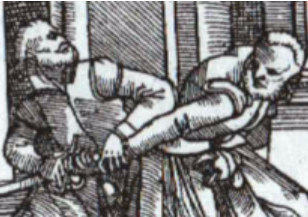Joint locking techniques
(Created page with "Meyer provides a number of joint locking techniques designed to control the opponent's arm (usually their weapon arm) by moving against the natural direction of motion for a j...") |
|||
| Line 1: | Line 1: | ||
Meyer provides a number of joint locking techniques designed to control the opponent's arm (usually their weapon arm) by moving against the natural direction of motion for a joint. | Meyer provides a number of joint locking techniques designed to control the opponent's arm (usually their weapon arm) by moving against the natural direction of motion for a joint. | ||
| − | The following five basic drills provide a foundation on which students can build while training. | + | The following five basic drills provide a foundation on which students can build while training. For beginner training these are performed from a neutral position in which the recipient of the lock stands with their right foot forward, arm extended and slightly bent. The student performing the technique stands with their left foot forward outside the recipient's lead leg. The student's left hand rests on the outside of the target's right elbow, and their right hand is on the outside of their wrist. |
| + | |||
| + | For later levels of experience this moves to a dynamic technique in both unarmed and armed situations. | ||
==Close Straight Arm Break to the Elbow/Shoulder== | ==Close Straight Arm Break to the Elbow/Shoulder== | ||
| + | |||
| + | [[File:MeyerArmbar.png | center]] | ||
| + | |||
| + | * Grasp the right wrist tightly with the right hand, and bring it to the chest. | ||
| + | * Grasp the right forwarm with the left hand, clutching it tightly to the body. | ||
| + | * Turn slightly to extend their arm, rolling it forward so their elbow is upward. | ||
| + | * Place the elbow a hand's width above their elbow, pressing down and lowering the body, forcing them down or breaking their elbow. | ||
| + | |||
| + | Additional pressure can be added by compassing the rear leg around, or by stepping forward in front of their lead leg with the left leg. | ||
==Figure 4 Break== | ==Figure 4 Break== | ||
Revision as of 04:39, 27 June 2016
Meyer provides a number of joint locking techniques designed to control the opponent's arm (usually their weapon arm) by moving against the natural direction of motion for a joint.
The following five basic drills provide a foundation on which students can build while training. For beginner training these are performed from a neutral position in which the recipient of the lock stands with their right foot forward, arm extended and slightly bent. The student performing the technique stands with their left foot forward outside the recipient's lead leg. The student's left hand rests on the outside of the target's right elbow, and their right hand is on the outside of their wrist.
For later levels of experience this moves to a dynamic technique in both unarmed and armed situations.
Contents |
Close Straight Arm Break to the Elbow/Shoulder
- Grasp the right wrist tightly with the right hand, and bring it to the chest.
- Grasp the right forwarm with the left hand, clutching it tightly to the body.
- Turn slightly to extend their arm, rolling it forward so their elbow is upward.
- Place the elbow a hand's width above their elbow, pressing down and lowering the body, forcing them down or breaking their elbow.
Additional pressure can be added by compassing the rear leg around, or by stepping forward in front of their lead leg with the left leg.
